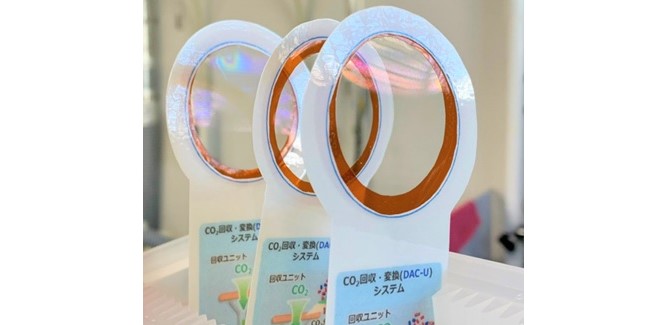MOU signed by Kyushu University, Sojitz, and Kyushu Electric Power for Joint Development and Verification of DAC-U Systems
Kyushu University, Sojitz Corporation (“Sojitz”), and Kyushu Electric Power Co., Inc. (“Kyushu Electric Power”) have signed a memorandum of understanding for joint development and verification for the application of a Direct Air Capture and Utilization (DAC-U) system. The DAC-U apparatus will combine both a separation membrane-based direct air capture (m-DACTM) unit currently under development*¹ by Kyushu University that allows carbon dioxide to be extracted directly from the atmosphere, with another device that converts the captured carbon dioxide into fuel.
In February 2022, Kyushu University and Sojitz concluded a memorandum for the implementation and commercialization of m-DACTM technology and related cutting-edge CO2 conversion and application technologies. Kyushu University and Sojitz have continued to move forward with basic R&D and practical implementation for DAC-U systems while seeking a partner company for verification tests and the development of technical applications. Kyushu University and Sojitz have now partnered with Kyushu Electric Power to conclude a memorandum for the project.
Joint verification tests will include installation of DAC-U systems in residential and commercial building powered by Kyushu Electric Power in order to contribute to the realization of carbon neutrality in the region. Kyushu University will provide information and expertise on the DAC-U systems while Sojitz will conduct business model validation via the Sojitz Institute of Innovative Technologies, Ltd.*² Kyushu Electric Power will conduct verification tests of DAC-U systems from a user standpoint and identify sites that can be used for verification.
Moving forward, Kyushu University, Sojitz, and Kyushu Electric Power will continue to advance R&D under this industry-academia partnership to develop applications for DAC-U systems to provide solutions to social issues and accelerate progress towards carbon neutrality.
*1: The International Institute for Carbon-Neutral Energy Research and the Research Center for Negative Emissions Technologies at Kyushu University are working on R&D under the Moonshot Research and Development Program of Japan’s Cabinet Office. The program’s mission is “to tackle important social issues including our shrinking and aging societies, global climate change and extreme natural disasters, the Moonshot R&D Program is pursuing disruptive innovations in Japan and promoting challenging R&D based on revolutionary concepts.”
Moonshot R&D|About (jst.go.jp)
*2: Sojitz Institute of Innovative Technologies, Ltd. is a fully owned subsidiary of Sojitz Corporation which was established with the aim of discovering and developing promising new technologies based on the opinions of experts in the field.
[m-DACTM Technology and DAC-U systems]
DAC technology enables carbon dioxide to be directly captured from the atmosphere. Countries around the world are currently conducting R&D on this important technology, which is seen as a means of realizing carbon neutrality and working towards a “Beyond Zero Society.”
Kyushu University is continuing R&D on m-DACTM technology, and the current separation membrane system is characterized by a higher permeability for carbon dioxide in comparison to previous membranes. As a result, the new separation membrane technology has less than one-tenth the area of previous models and uses less energy. The separation membrane does not use chemicals such as CO2 absorbent and this system allows the amount of CO2 captured to be adjusted as necessary. Additionally, installation sites for DAC technology were previously quite limited due to the size of the equipment. However, m-DACTM technology will be available in a range of sizes and systems to accommodate different sites for CO2 capture. Kyushu University is also working on the development of a CO2 conversion unit to go with the m-DACTM unit, which will integrate all processes from carbon capture to carbon fuel production with one DAC-U system. By utilizing DAC-U systems, Kyushu University aims to offer new solutions for building a carbon recycling society with local production and local consumption of CO2.

